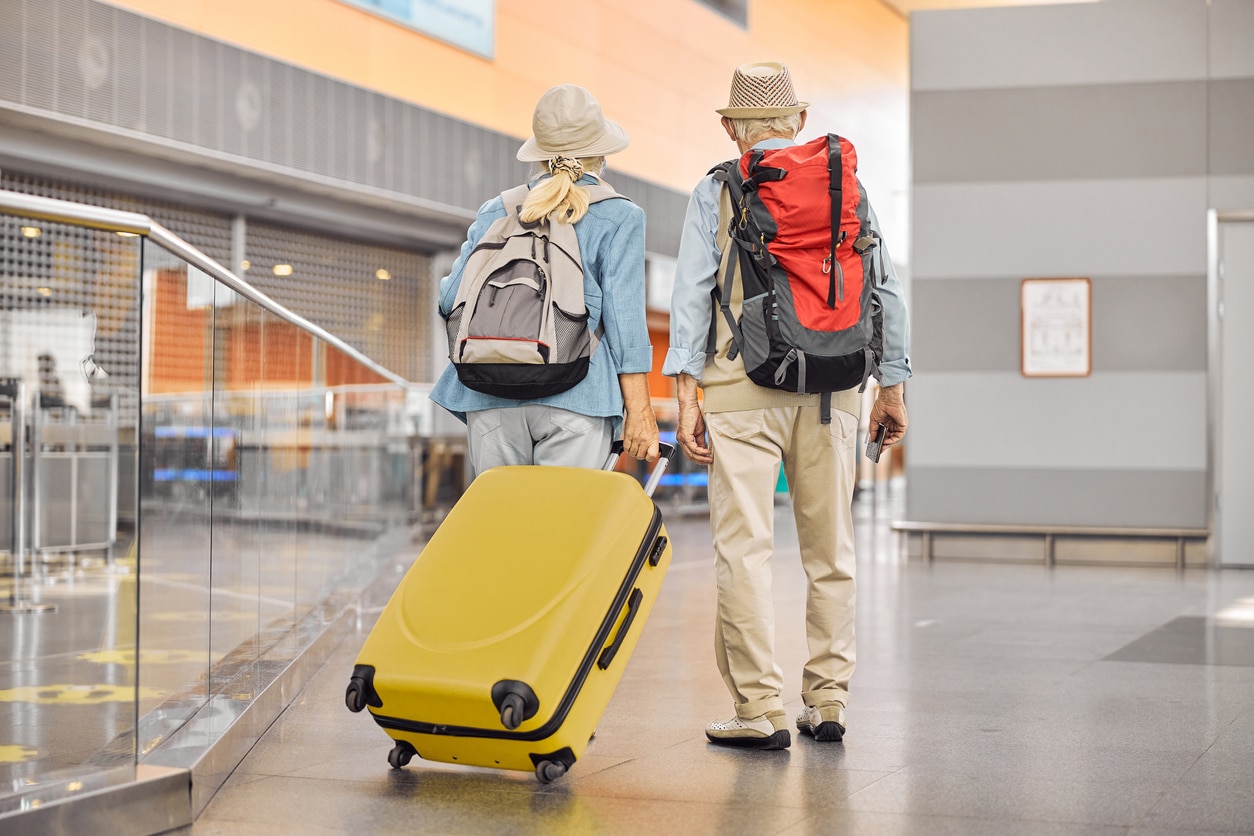American adults are living longer – the average life expectancy for all races and genders is 78.7 years, according to the CDC; U.S. women live to 81 1. This leaves more time for leisure pursuits like travel.
As with any activity or major undertaking, seniors should consult with their healthcare providers before heading out to understand their overall health, vaccinations or medications they might need to travel, and other well-being considerations. It’s also vital to check the COVID-19 situation at your destination and any stop along the way, and to make sure you understand what you need to do to stay safe during the journey and during your stay. The CDC has a helpful travel site that includes the latest information on domestic and international travel by road, rail, air and sea.2
Tips for Seniors Planning to Travel
These eight travel tips for seniors help empower you to have a fun and safe adventure away from home:
1. Plan for your mobility, ability and activity levels.
You won’t have a good time – and neither will your traveling companions – if you’re unable to participate, worried about your abilities or get hurt. Choose accommodations and build an itinerary that matches your health and enables you to truly engage and enjoy the trip.
2. Make your needs known early.
Carriers want you to be safe and comfortable during the trip. If you travel with portable oxygen or a scooter, many carriers can accommodate you with at least 48 hours’ notice. “If you have mobility issues, do not be afraid to speak up,” asserts Karen Villano, the travel expert behind IFlyRight.net and an airline employee.. It’s also important to let the gate agent or station manager know if you need extra time or help moving around. “We see customers left at a gate and when gates change the customer misses the flight – every day”. Similarly, if you need an accessible bathroom or a first-floor room, request it when you make the reservation and confirm it a few days before you arrive.
3. Verify vaccination requirements as soon as possible.
Depending on where you’re going, you may need more than a COVID-19 vaccination. Contact your primary care provider to determine what pre-travel vaccines and other treatments they recommend based on your medical history and current health. Do this as far in advance as possible because some vaccinations can require up to several months to be effective, depending on where you plan to travel.
4. Avoid injury en route.
You don’t want to get hurt muscling a heavy bag into the overhead bins. Many travelers choose to carry on in fear of their bags being lost. But data from the U.S. Department of Transportation’s Air Travel Consumer Report shows that only 5 bags and 1 wheelchair or scooter of every 1,000 loaded into the cargo bay were mishandled or lost in the first quarter of 2020, the last “normal” quarter for air travel before COVID restrictions 2. Another reason: “Check your bags so you don’t have to put them in overhead — the flight crew cannot put the bag up for the traveler,” Villano says. This holds true for rail travel, too.
5. Manage your medications.
Some carriers require certain medications to be accompanied by a special certificate. Ask your pharmacist for a complete list of your prescription medications and ask which ones need paperwork. Add any OTC drugs to the list as well. Pack your drugs in your carry-on bag in case you misplace your bag. Stash copies of your prescriptions in a separate bag so you can get refills if necessary. Whenever possible, keep all drugs in the original packaging and carry copies of your prescriptions.
6. Wash your hands and wear a mask.
Planes, trains, cruise ships and other modes of transport pack a lot of people in a small space. At this writing, the CDC requires “the wearing of masks by travelers to prevent spread of the virus that causes COVID-19. Conveyance operators must also require all persons onboard to wear masks when boarding, disembarking, and for the duration of travel. Operators of transportation hubs must require all persons to wear a mask when entering or on the premises of a transportation hub.” 3 Buy extra masks and keep a few in every bag you pack, especially your carry-on. To further reduce the spread of germs (yours and others’), wash your hands or use hand sanitizer frequently and wipe down surfaces like tray tables.
7. Keep contact information easily accessible.
With so many of us using mobile phones, we may not remember phone numbers like we used to. “So many times I tried to call someone to get assistance and the customer does not know a number,” Villano adds. “Put your cell phone number and emergency contact numbers in your reservation when you make it and keep phone numbers written down in case of emergency.”
8. Take good care of yourself.
To make sure you’re healthy enough to get the most of your trip, take good care of yourself, advises, Sara Baer-Sinnot, president of Oldways, a company offering chef-led culinary travel tours. “This includes making good choices about what you eat, staying hydrated, getting sufficient sleep and exercising,” she says. “Be present, mindful, patient, and grateful to be able to travel. Enjoy every moment.”
Following these travel tips for seniors can help you ease the stress of prepping for a trip and increase your confidence in having a fun and safe trip.
———-
Don’t disregard professional medical advice, or delay seeking it, because of what you read here. This information is not intended as a substitute for professional consultation, diagnosis or treatment; it is provided “as is” without any representations or warranties, express or implied. Always consult a healthcare provider if you have specific questions about any medical matter, and seek professional attention immediately if you think you or someone in your care may be experiencing a healthcare condition or medical emergency.
1 National Center for Health Statistics. Health, United States, 2019: Table 004. Hyattsville, MD. 2021. Available from: https://www.cdc.gov/nchs/hus/contents2019.htm
2 https://www.transportation.gov/sites/dot.gov/files/2020-07/May%202020%20ACTR%20rev%207-7-2020.pdf
3 Centers for Disease Control and Prevention, National Center for Emerging and Zoonotic Infectious Diseases (NCEZID), Division of Global Migration and Quarantine (DGMQ). Available from: https://www.cdc.gov/quarantine/masks/mask-travel-guidance.html




